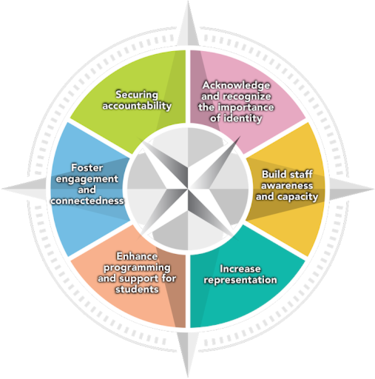
"Current systems of education were not designed for the challenges we now face. They were developed for a different era. Reform is not enough: they need to be transformed." - Sir Ken Robinson
In today's dynamic world, driven by technological advancements, economic shifts and evolving social landscapes, organizations must continuously adapt and learn. The OCDSB is committed to ensuring that our education system meets the evolving needs of our students and prepares them for success in a rapidly changing world. We strive to build a learning community that provides equitable opportunities for all students to reach their full potential.
To achieve this, we have launched the process to develop a new Indigenous, Human Rights and Equity Roadmap for 2024-2028, guided by a compass of six key focus areas.
Focus Areas

We engaged with students, families and staff to identify six critical needs for cultivating equity in our District:
- Accountability: Demonstrating transparency and responsibility in our actions.
- Identity: Recognizing and valuing the importance of individual, intersecting and collective identities.
- Staff Awareness and Capacity: Equipping educators with the knowledge and skills to implement equitable and inclusive practices effectively.
- Representation: Increasing representation of diverse voices and perspectives at all levels within the OCDSB.
- Programming and Student Support: Enhancing programs and targeted support for all students, particularly those facing systemic barriers.
- Engagement and Connectedness: Fostering a community of belonging for all members of the OCDSB community.
One student emphasized the importance of this work by saying, "When you know our stories, you know the needs and the barriers that can stop us from learning." The student's voice speaks to educators knowing their passions, interests, potential, possibilities and challenges to positively support their academic success and well-being.
What We’ve Done
Our new Roadmap will build on the 2020-2023 Indigenous, Equity & Human Rights Roadmap, which aims to create a discrimination-free, accessible, equitable and inclusive environment for all.
As part of our work on the 2020-2023 Roadmap, we gathered and analyzed District data and listened to feedback from our community to learn more about inequities experienced by students, staff, families and community members. Key findings included:
- Achievement Gaps: Students who are underserved, including Indigenous students, students with special education needs (excluding gifted) and those from low-income neighbourhoods, consistently demonstrate lower academic achievement. These same groups are underrepresented among students considered "on track" for graduation.
- Inequity in Discipline: Students who are Indigenous, Black, Middle Eastern, gender-diverse and those with disabilities face disproportionately higher suspension rates, with a significant portion of these suspensions being discretionary.
- Sense of Belonging: Students who identify as gender-diverse, 2SLGBTQ+, Indigenous or racialized reported a lower sense of belonging.
- Staff Experiences: 29% of racialized staff reported experiencing discrimination during the hiring process.
Between 2020 and 2023, we took steps to address inequities in our systems, structures, policies and practices and to build trust with students, families, staff and communities. View our Roadmap Progress Tracker to learn more.